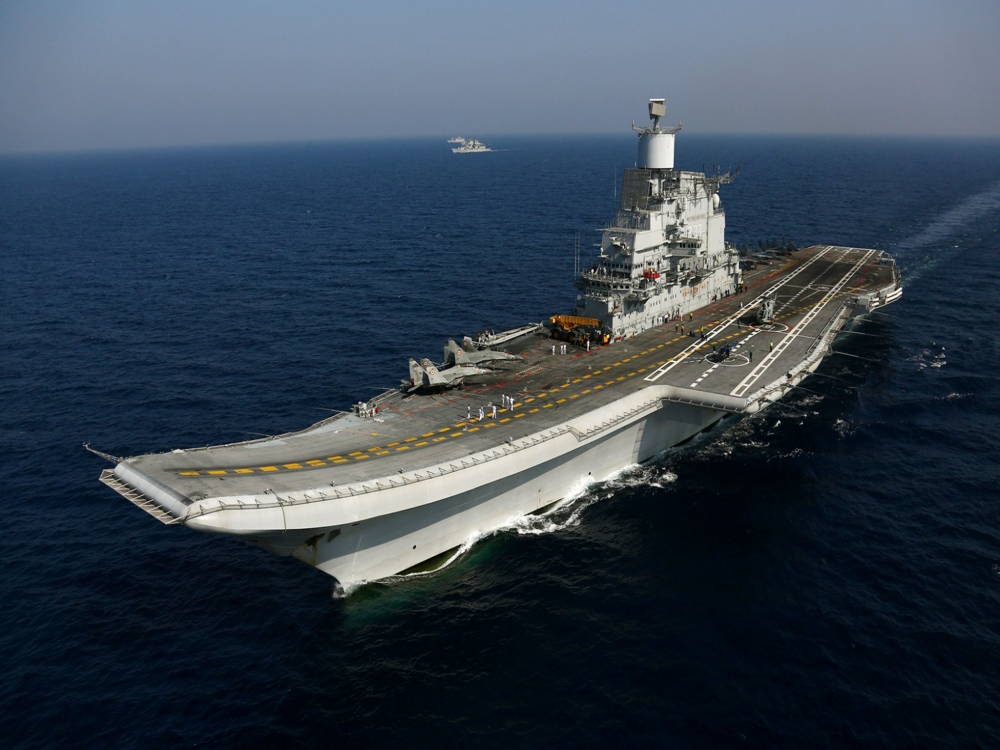

Ships during the Quad naval exercises
<p>
Japan has sounded the alarm about China&rsquo;s regional intent ahead of the first summit of the Quad grouping, which also includes India, Australia and the United States that is likely to take place later this week.</p>
<p>
In a pro-active move, Japan&rsquo;s Prime Minister Suga Yoshihide spoke for around 40 minutes with Prime Minister Narendra Modi where the two leaders recognised that it was increasingly important to recognise the importance of a &ldquo;Free and open Indo-Pacific&rdquo;. In plain language, the two leaders were focused on the threat posed by China to the status quo in the Indo-pacific&mdash;a geographic space on either side of the Malacca straits. The Malacca straits link the Indian and the Pacific Oceans and is major choke point of the east-west international trade.</p>
<p>
PM Modi and Suga also agreed to advance not only the India-Japan relationship, but also cement bonds of the Indo-Pacific Quad.</p>
<p>
&ldquo;The two leaders shared the recognition that cooperation towards realizing a Free and Open Indo-Pacific is becoming increasingly important and to this end, shared the view to steadily advance both Japan-India bilateral cooperation and Japan-Australia-India-U.S. quadrilateral cooperation,&rdquo; a press statement of the Japanese foreign ministry said.</p>
<p>
Naming China, the strongly worded statement said that &ldquo;Prime Minister Suga expressed serious concerns regarding unilateral attempts to change the status quo in the East and South China Sea, China&rsquo;s Coast Guard Law and the situation in Hong Kong and the Xinjiang Uyghur Autonomous Region (XUAR).&rdquo;</p>
<p>
&ldquo;Prime Minister Suga also asked for understanding and cooperation toward the early resolution of the abductions issue by North Korea. Furthermore, the two leaders confirmed that they have grave concerns over the situation in Myanmar and they would closely work together in this vein.&rdquo;</p>
<p>
The conversation of the two leaders comes ahead of the widely expected Quad summit later this week. US President Joe Biden has spoken to the prime ministers of all three countries– Prime Minister Narendra Modi, Australian Prime Minister Scott Morrison and Japanese Premier Suga. But a joint meeting of the four leaders would give a collective Indo-Pacific strategy a high-octane push.</p>
<p>
China is the elephant in the room which had apparently&nbsp;&nbsp; triggered an energetic response from the four democracies. Amid the Covid-19 pandemic, China has been visibly asserting itself in a strategic arc stretching from the Pacific to the shores of the Indian Ocean in Africa, and everything that falls within.</p>
<p>
Chinese President Xi Jinping on Tuesday declared that the country&#39;s military must be &ldquo;prepared to respond&rdquo; to the current &quot;complex and difficult situations&quot; which remain largely unstable and uncertain.</p>
<p>
&ldquo;The current security situation of our country is largely unstable and uncertain. The entire military must coordinate the relationship between capacity building and combat readiness, be prepared to respond to a variety of complex and difficult situations at any time, resolutely safeguard national sovereignty, security and development interests, and provide strong support for the comprehensive construction of a modern socialist state,&rdquo; the South China Morning Post quoted Xi as saying during a panel discussion attended by armed forces representatives in Beijing.</p>
<p>
Amid heightened frictions with China the Indian Navy and its partners in the Quad after the summit will engage in complex interoperability exercises involving carrier strike groups, anti-submarine warfare aircraft and attack submarines in April&ndash; a move aimed at projecting their dominance from the Persian Gulf to the Malacca Straits as reported the Hindustan Times.</p>
<p>
Quad&rsquo;s strategic allies France and the United Arab Emirates (UAE) will be part of this exercise. The UAE will be joining India and France for the first time in a trilateral naval exercise in the strategically important Persian Gulf and the Gulf of Oman in late April under the Varuna banner. This is scheduled between April 25 and 27. UAE&rsquo;s naval chief confirmed his country&rsquo;s participation in the Varuna trilateral exercises.</p>
<p>
During their conversation, the two leaders exchanged views on Japan-India relations and concurred that they would continue their effort to materialise the &ldquo;Japan-India Special Strategic and Global Partnership&rdquo; through cooperation in such areas as security and defence, economic relationship including digital fields and people-to-people exchanges. Suga and Modi also welcomed the progress on the high-speed rail project and the signing of the Memorandum of Cooperation on specified skilled workers.</p>
The Indian Army and the Mongolian Armed Forces will commence the 17th edition of their…
Pandi Ram Mandavi, a renowned artist from Bastar, Chhattisgarh, was conferred the Padma Shri award…
Taiwan's Mainland Affairs Council (MAC) criticised China on Wednesday for organising two summits for Taiwanese…
The East Turkistan Government in Exile (ETGE) vehemently denounces Mr. Francesco Frangialli, the Honorary Secretary-General…
Chairman John Moolenaar and Ranking Member Raja Krishnamoorthi of the House Select Committee on the…
Representative Thinlay Chukki from the Tibet Bureau in Geneva spearheaded a delegation's trip to Frankfurt…